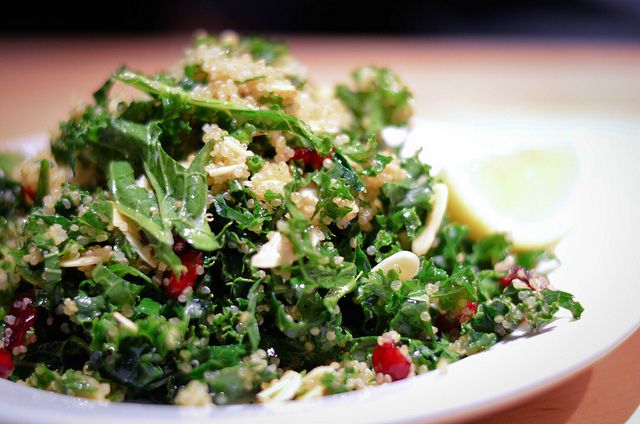Why Your Salad Obsession Could Be Hurting The Planet
By Anthony Todd in Food on Aug 24, 2015 2:34PM
It seems like the healthiest, most innocuous thing to eat: a pile of greens, lightly dressed, maybe with a few shreds of meat or a hard boiled egg and a handful of nuts. It's the ideal lunch, right? Michael Pollan told us to eat mostly plants, right?
Well, up is down and down is up and everything is turned around, because Tamar Haspel has penned an essay in the Washington Post claiming that your salad addiction is really messing up the world. In a time when agricultural resources are tight and we need to feed more and more people, lettuce is a big ole' mess.
"It occupies precious crop acreage, requires fossil fuels to be shipped, refrigerated, around the world, and adds nothing but crunch to the plate," food journalist Haspel writes. Ouch.
And she's not wrong, though there's no reason to panic. Her primary arguments all revolve around why lettuce is bad for the universe, and come down to the following: It takes up lots of water, leads to a ton of waste, doesn't give much nutrition and provides the illusion of health. Two of those are really important to keep in mind, while two of them are pretty easily fixed— but she's definitely brought up some points worth thinking about.
Let's take each point in turn.
First, the claim that lettuce sucks up water and doesn't provide nutrition. This is where her argument begins, and it's also where it's the most depressing. She uses iceberg lettuce as her example, which alarmingly has the same amount of water as a bottle of Evian (96 percent water). That's pretty ridiculous, and is a good argument for local eating (and not growing our water-hungry foods in places in the middle of a drought). She also points out that next on the water-hog list are radishes, cucumbers and celery, which don't provide much nutrition and are basically water sacks being shipped around in veggie disguises.
Ok, that could be a problem. On the other hand, a lot of us get a good portion of our daily water intake from these veggies, and they provide genuine enjoyment in our diets. If you come for my radishes, you'll have to pry them from my cold dead hands. But iceberg? It's mostly a waste of water and refrigerator space.
Second (and more importantly) the waste factor. The preparation of bagged salad greens creates a billion pounds of waste a year—which is why the lazy jerks who buy them should consider buying real greens and processing them themselves. Plus, then the scraps can go in your compost pile or be frozen for soup stock, in order to reduce a little bit of the waste factor.
Last, and most importantly, is the illusion of health. Some people think that if you add lettuce to a plate, everything from fried chicken to a big mac suddenly becomes healthy. That's why McDonald's can get away with salads that have more calories than hamburgers. A really useful tip from Haspel: envision everything on your salad that isn't lettuce as if it were on a plate by itself. Does that pile of nuts, berries and a little cheese look healthy if you were to eat it as an entree? Well good, because that's what your doing; the lettuce is just filler. But if that big pile of cheese, chicken strips and corn chips looks more like a game-day snack, you're doing it wrong.
Hysteria aside, can we do better with our salads? Of course we can. My standard salad mix, which I put together once a week, has almost no lettuce, instead relying on a combination of kale, arugula and radicchio, all of which are more nutrient dense and have less water. They're also easy to get locally in-season or grow in your backyard with a minimum of fuss. If you can cut bagged salad out of your routine, you'll be doing the environment a favor. And if you have to eat iceberg lettuce, at least have the decency to use it for it's highest purpose: a delicious wedge salad.
